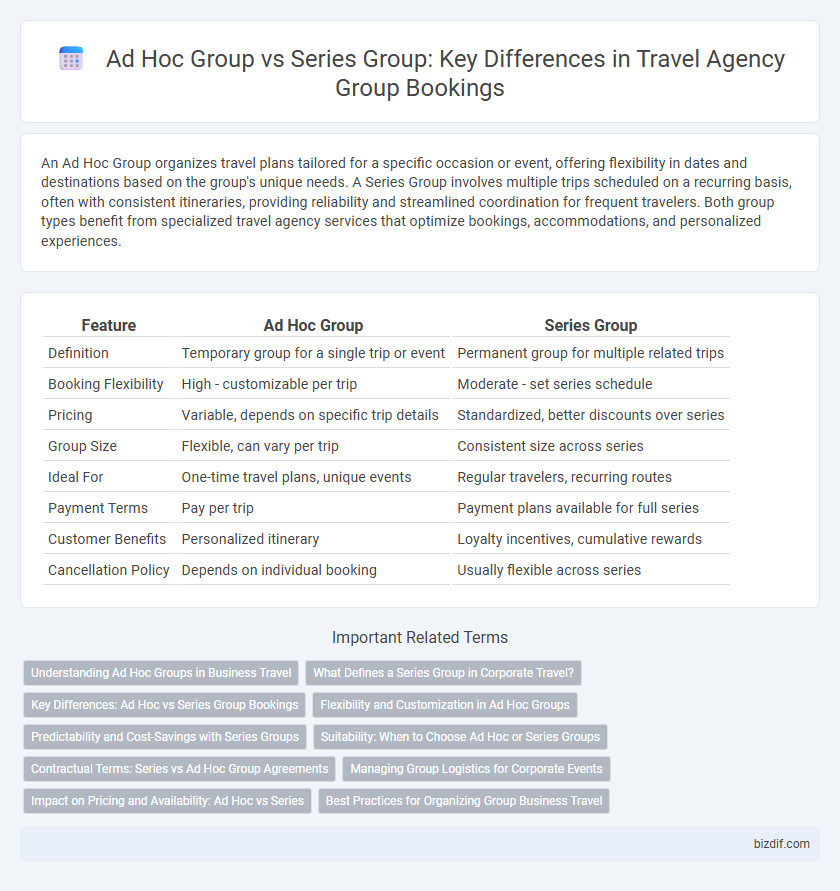An Ad Hoc Group organizes travel plans tailored for a specific occasion or event, offering flexibility in dates and destinations based on the group's unique needs. A Series Group involves multiple trips scheduled on a recurring basis, often with consistent itineraries, providing reliability and streamlined coordination for frequent travelers. Both group types benefit from specialized travel agency services that optimize bookings, accommodations, and personalized experiences.
Table of Comparison
| Feature | Ad Hoc Group | Series Group |
|---|---|---|
| Definition | Temporary group for a single trip or event | Permanent group for multiple related trips |
| Booking Flexibility | High - customizable per trip | Moderate - set series schedule |
| Pricing | Variable, depends on specific trip details | Standardized, better discounts over series |
| Group Size | Flexible, can vary per trip | Consistent size across series |
| Ideal For | One-time travel plans, unique events | Regular travelers, recurring routes |
| Payment Terms | Pay per trip | Payment plans available for full series |
| Customer Benefits | Personalized itinerary | Loyalty incentives, cumulative rewards |
| Cancellation Policy | Depends on individual booking | Usually flexible across series |
Understanding Ad Hoc Groups in Business Travel
Ad hoc groups in business travel consist of small, flexible teams formed spontaneously for specific trips or meetings, allowing tailored itineraries and quick adjustments. These groups often benefit from personalized booking options and optimized travel routes, enhancing efficiency and cost-effectiveness for corporate clients. Understanding the distinction between ad hoc groups and series groups is crucial for travel agencies to offer customized solutions that meet varied client needs and maximize travel program ROI.
What Defines a Series Group in Corporate Travel?
A Series Group in corporate travel is defined by multiple travelers booked under a single contract or itinerary for recurring trips, often with standardized travel policies and negotiated rates. This structure allows businesses to streamline bookings for employees attending repetitive events, conferences, or training sessions, ensuring consistency and cost control. Series Groups differ from Ad Hoc Groups, which involve one-time or irregular group travel arrangements without a long-term agreement.
Key Differences: Ad Hoc vs Series Group Bookings
Ad Hoc Group bookings offer flexibility by allowing travelers to join or leave without a fixed itinerary, ideal for spontaneous or varied schedules. Series Group bookings involve pre-planned, recurring trips with a fixed schedule and itinerary, providing consistency and often discounted rates for large groups. The key difference lies in the commitment level and structure, with Ad Hoc allowing individual adjustments and Series requiring collective agreement on travel details.
Flexibility and Customization in Ad Hoc Groups
Ad Hoc Groups provide unparalleled flexibility and customization, allowing travel agencies to tailor itineraries and services for individual preferences and schedules, unlike Series Groups which follow a fixed, repetitive plan. This adaptability ensures customized travel experiences for diverse client needs, optimizing satisfaction and engagement. Agencies benefit from the ability to adjust group size, destinations, and activities dynamically, enhancing operational agility.
Predictability and Cost-Savings with Series Groups
Series groups offer enhanced predictability by locking in travel arrangements across multiple dates, allowing organizations to plan with consistent costs and reduced variability. This approach generates significant cost savings through bulk purchasing and negotiated rates, outperforming the ad hoc group's sporadic booking and fluctuating prices. Travel agencies recommend series groups for clients seeking budget control and streamlined travel management.
Suitability: When to Choose Ad Hoc or Series Groups
Ad Hoc groups suit travelers seeking flexible, small-group arrangements without long-term commitments, ideal for customized itineraries or spontaneous plans. Series groups benefit clients preferring structured, recurring trips with consistent schedules and pricing, perfect for business or frequent leisure travelers. Choosing between Ad Hoc and Series groups depends on the client's need for adaptability versus routine and budget predictability.
Contractual Terms: Series vs Ad Hoc Group Agreements
Series group agreements in travel agencies typically involve predefined contractual terms covering multiple trips within a set timeframe, ensuring consistency in pricing, cancellation policies, and service standards. Ad hoc group agreements are customized per event, offering flexibility in contract terms tailored to each group's specific requirements and schedules. Understanding the differences in these contracts helps travel agencies optimize agreements for predictable revenue and client satisfaction.
Managing Group Logistics for Corporate Events
Ad hoc groups are temporary, formed for a single corporate event, allowing travel agencies to tailor logistics specifically to unique dates and attendee numbers without ongoing commitments. Series groups involve recurring travel arrangements over multiple events, enabling streamlined management and cost efficiencies through negotiated rates and consistent scheduling. Effective management of both group types requires precise coordination of transportation, accommodation, and event schedules to ensure smooth execution and maximize client satisfaction.
Impact on Pricing and Availability: Ad Hoc vs Series
Ad Hoc groups allow flexible booking with individual seat selections, resulting in variable pricing and availability based on current inventory, ideal for spontaneous travel plans. Series groups offer fixed blocks of seats reserved in advance, providing consistent pricing and guaranteed availability but less flexibility for changes. Travel agencies must weigh the benefits of Ad Hoc's adaptability against Series' stability to optimize cost-efficiency and customer satisfaction.
Best Practices for Organizing Group Business Travel
For organizing group business travel, Ad Hoc Groups provide flexibility by accommodating spontaneous or irregular travel needs without long-term commitments. Series Groups offer consistency and streamlined management through recurring trips scheduled over a defined period, optimizing cost control and itinerary standardization. Best practices include evaluating group size, travel frequency, and budget constraints to determine the ideal group type, leveraging technology platforms for booking coordination and communication efficiency.
Ad Hoc Group vs Series Group Infographic

 bizdif.com
bizdif.com